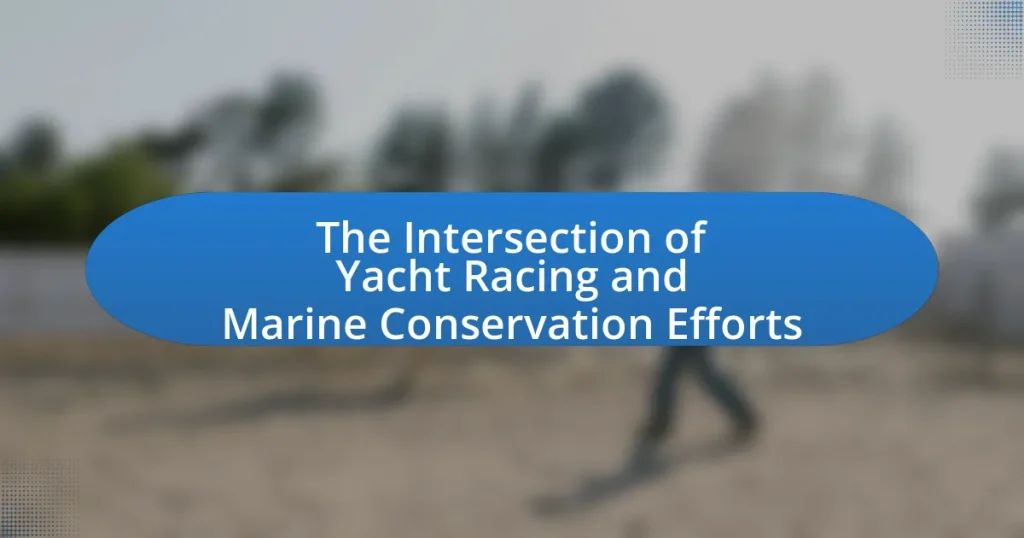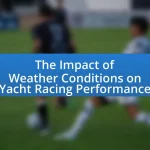The article examines the intersection of yacht racing and marine conservation efforts, highlighting the sailing community’s commitment to environmental sustainability and the protection of marine ecosystems. It discusses how yacht racing events, such as the Ocean Race, incorporate initiatives to reduce plastic waste, promote clean oceans, and support marine protected areas. The article also explores the historical connections between yacht racing and conservation, the influence of yacht racing on marine initiatives, and the challenges posed by the sport to marine environments. Additionally, it outlines current initiatives, the role of sponsors, and future trends in promoting sustainability within yacht racing, emphasizing the importance of integrating eco-friendly practices and technologies to enhance marine conservation outcomes.
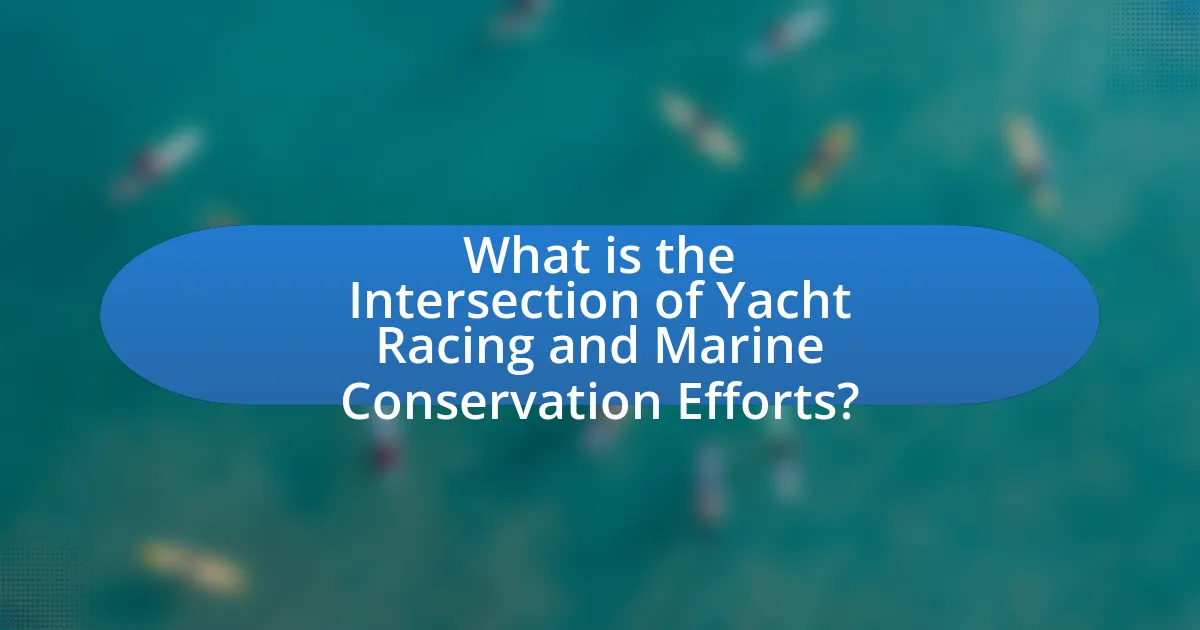
What is the Intersection of Yacht Racing and Marine Conservation Efforts?
The intersection of yacht racing and marine conservation efforts lies in the growing commitment of the sailing community to promote environmental sustainability and protect marine ecosystems. Yacht racing events increasingly incorporate initiatives aimed at reducing plastic waste, promoting clean oceans, and supporting marine protected areas. For instance, the Ocean Race has implemented sustainability measures, including partnerships with organizations like the World Wildlife Fund, to raise awareness about ocean health and engage sailors in conservation activities. This collaboration highlights the potential of yacht racing to serve as a platform for environmental advocacy, demonstrating that competitive sailing can align with and support marine conservation goals.
How do yacht racing and marine conservation intersect?
Yacht racing and marine conservation intersect through initiatives that promote environmental awareness and sustainable practices within the sport. Many yacht racing organizations, such as the Ocean Race, have implemented measures to reduce plastic waste and protect marine ecosystems, recognizing the impact of their activities on ocean health. For instance, the Ocean Race has partnered with various conservation groups to raise awareness about ocean pollution and has committed to using sustainable materials in their events. This intersection not only fosters a culture of responsibility among sailors but also engages the public in marine conservation efforts, highlighting the importance of protecting the oceans that serve as the backdrop for yacht racing.
What are the historical connections between yacht racing and marine conservation?
Yacht racing has historically influenced marine conservation through the promotion of environmental awareness and the establishment of protective measures for marine ecosystems. Since the late 20th century, yacht racing events, such as the America’s Cup and the Volvo Ocean Race, have increasingly incorporated sustainability initiatives, highlighting the impact of climate change and pollution on oceans. For instance, the Volvo Ocean Race has included a “Race for Water” campaign, which raises awareness about plastic pollution and promotes ocean health. Additionally, yacht clubs and racing organizations have often collaborated with conservation groups to advocate for marine protected areas, demonstrating a commitment to preserving marine biodiversity. These connections illustrate how the competitive nature of yacht racing can serve as a platform for advancing marine conservation efforts.
How has yacht racing influenced marine conservation initiatives?
Yacht racing has significantly influenced marine conservation initiatives by raising awareness and funding for ocean preservation efforts. High-profile yacht races, such as the Volvo Ocean Race, have incorporated sustainability as a core value, promoting initiatives like the “Race for Water” campaign, which focuses on reducing plastic pollution in oceans. Additionally, yacht racing organizations often collaborate with environmental NGOs to implement conservation programs, such as habitat restoration and marine protected areas, demonstrating a commitment to safeguarding marine ecosystems. These efforts have led to increased public engagement and support for marine conservation, highlighting the role of competitive sailing in fostering environmental stewardship.
Why is the intersection important for the marine environment?
The intersection of yacht racing and marine conservation efforts is important for the marine environment because it fosters awareness and funding for ocean preservation initiatives. Yacht racing events often attract significant media attention and sponsorship, which can be leveraged to promote marine conservation messages and raise funds for environmental projects. For instance, the Volvo Ocean Race has incorporated sustainability initiatives, such as the “Race for Water” campaign, which aims to combat plastic pollution in the oceans. This integration of competitive sailing with conservation efforts not only educates participants and spectators about marine issues but also encourages responsible practices within the sailing community, ultimately benefiting marine ecosystems.
What role does yacht racing play in raising awareness about marine issues?
Yacht racing plays a significant role in raising awareness about marine issues by leveraging its visibility and community engagement to highlight environmental challenges. Events like the Volvo Ocean Race and the America’s Cup often incorporate educational initiatives and partnerships with marine conservation organizations, effectively reaching a global audience. For instance, the Volvo Ocean Race has included a “Race for Water” campaign, which focuses on ocean pollution and promotes sustainable practices. This integration of competitive sailing with environmental advocacy not only informs participants and spectators about marine issues but also inspires action towards conservation efforts.
How can yacht racing contribute to funding conservation projects?
Yacht racing can contribute to funding conservation projects through sponsorships, fundraising events, and partnerships with environmental organizations. Major yacht racing events often attract corporate sponsors who allocate a portion of their funding to support marine conservation initiatives. For example, the Volvo Ocean Race has partnered with the United Nations to promote ocean health, raising awareness and funds for marine conservation. Additionally, yacht clubs and racing organizations frequently host charity regattas, where entry fees and donations directly benefit conservation efforts. These financial contributions can be significant; for instance, the Ocean Race has raised millions for ocean conservation since its inception.
What challenges exist at the intersection of yacht racing and marine conservation?
Yacht racing poses significant challenges to marine conservation, primarily through environmental degradation and resource competition. The high-speed nature of yacht racing often leads to disturbances in marine ecosystems, including damage to coral reefs and disruption of marine wildlife habitats. Additionally, the use of non-biodegradable materials in yacht construction and maintenance contributes to ocean pollution. According to a study published in the journal “Marine Pollution Bulletin,” yacht races can generate substantial waste and emissions, further exacerbating the impact on marine environments. Furthermore, the competition for marine resources, such as clean water and space, can conflict with conservation efforts aimed at protecting vulnerable marine areas.
What are the environmental impacts of yacht racing?
Yacht racing has significant environmental impacts, primarily due to fuel emissions, marine pollution, and habitat disruption. The combustion of fossil fuels by racing yachts contributes to air pollution and greenhouse gas emissions, exacerbating climate change. Additionally, the use of antifouling paints can release toxic substances into the water, harming marine life. A study by the International Maritime Organization indicates that recreational boating, including yacht racing, contributes to approximately 10% of marine pollution from oil spills and waste discharge. Furthermore, the physical presence of racing events can disturb marine habitats, particularly in sensitive coastal areas, leading to long-term ecological consequences.
How do regulations affect yacht racing and conservation efforts?
Regulations significantly influence yacht racing and conservation efforts by establishing guidelines that promote environmental sustainability while ensuring fair competition. For instance, the International Sailing Federation enforces rules that limit emissions and waste from racing yachts, thereby reducing their ecological footprint. Additionally, regulations often mandate the use of eco-friendly materials and technologies in yacht construction and operation, which supports marine conservation initiatives. Studies have shown that regions with stringent marine protection laws experience healthier ecosystems, which in turn enhances the quality of yacht racing experiences. Thus, effective regulations create a balance between competitive sailing and the preservation of marine environments.
How can yacht racing promote sustainable practices?
Yacht racing can promote sustainable practices by integrating eco-friendly technologies and raising awareness about marine conservation. The adoption of renewable energy sources, such as solar panels and wind turbines on racing yachts, reduces reliance on fossil fuels, thereby minimizing carbon emissions. Additionally, yacht racing events often include educational components that inform participants and spectators about ocean health and the importance of protecting marine ecosystems. For instance, the Ocean Race has implemented sustainability initiatives that focus on reducing plastic waste and promoting responsible sailing practices. These efforts not only enhance the environmental consciousness of the sailing community but also inspire broader public engagement in sustainability issues.
What are some examples of sustainable yacht racing events?
Examples of sustainable yacht racing events include the Ocean Race, which emphasizes environmental responsibility and has initiatives to reduce plastic waste, and the 11th Hour Racing Team, which focuses on sustainability in its racing practices and promotes ocean health. The Ocean Race has implemented measures such as carbon offsetting and waste reduction strategies, while the 11th Hour Racing Team actively engages in marine conservation projects and advocates for sustainable practices within the sailing community.
How can yacht racers adopt eco-friendly technologies?
Yacht racers can adopt eco-friendly technologies by integrating renewable energy sources, such as solar panels and wind turbines, into their vessels. These technologies reduce reliance on fossil fuels, which are harmful to marine ecosystems. For instance, the use of solar panels can provide power for onboard systems without emitting greenhouse gases, while wind turbines can harness natural wind energy to supplement propulsion. Additionally, yacht racers can utilize biofuels and hybrid propulsion systems, which have been shown to decrease carbon emissions significantly. According to a study by the International Maritime Organization, transitioning to alternative fuels can reduce greenhouse gas emissions by up to 80%. By implementing these technologies, yacht racers not only enhance their sustainability but also contribute to marine conservation efforts.
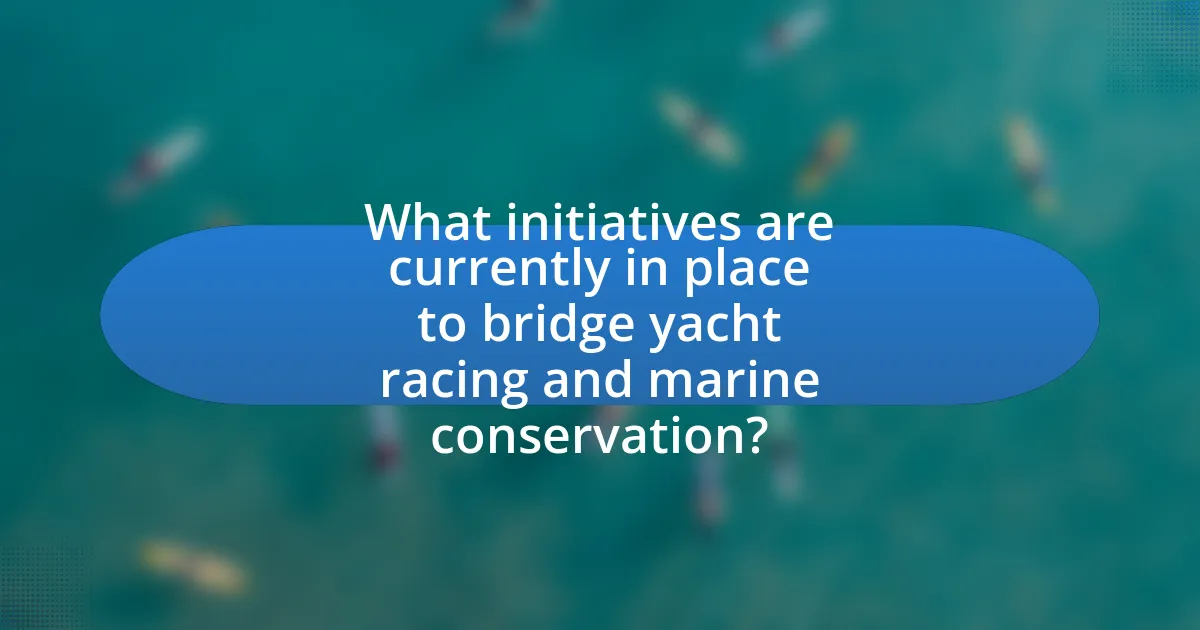
What initiatives are currently in place to bridge yacht racing and marine conservation?
Current initiatives bridging yacht racing and marine conservation include the Ocean Race’s commitment to sustainability, which mandates participating teams to adhere to environmental standards and engage in ocean health advocacy. Additionally, the Sailors for the Sea program promotes eco-friendly practices among sailors and yacht racing events, encouraging actions like beach clean-ups and reducing plastic use. These initiatives are supported by partnerships with organizations such as the United Nations Environment Programme, which emphasizes the importance of protecting marine ecosystems in conjunction with competitive sailing.
What organizations are involved in this intersection?
Organizations involved in the intersection of yacht racing and marine conservation efforts include the Ocean Conservancy, the World Wildlife Fund (WWF), and the Sailors for the Sea initiative. These organizations actively promote sustainable practices within the yacht racing community, focusing on reducing environmental impacts and advocating for marine protection. For instance, the Ocean Conservancy works on initiatives that align with yacht racing events to raise awareness about ocean health, while the WWF collaborates with yacht racing stakeholders to implement conservation strategies. Sailors for the Sea provides resources and programs that encourage yacht racers to adopt eco-friendly practices, demonstrating a commitment to marine conservation.
How do these organizations collaborate with yacht racing events?
Organizations collaborate with yacht racing events by integrating marine conservation initiatives into the racing framework. For instance, events like the Ocean Race have partnered with environmental organizations to promote sustainability practices among participants, such as reducing plastic waste and implementing eco-friendly technologies. These collaborations often include educational campaigns that raise awareness about marine conservation issues, leveraging the visibility of yacht racing to reach broader audiences. Additionally, data collected during races can inform conservation strategies, as seen in partnerships where telemetry and environmental monitoring are utilized to study marine ecosystems.
What programs have been successful in promoting marine conservation through yacht racing?
Programs such as the Ocean Race and the Sailors for the Sea initiative have been successful in promoting marine conservation through yacht racing. The Ocean Race incorporates sustainability into its events by raising awareness about ocean health and supporting scientific research, while Sailors for the Sea engages the sailing community in conservation efforts, providing resources and education on reducing marine pollution. Both programs demonstrate a commitment to environmental stewardship, evidenced by their partnerships with organizations like the United Nations and various marine research institutions, which further validate their impact on marine conservation.
What role do sponsors play in supporting marine conservation through yacht racing?
Sponsors play a crucial role in supporting marine conservation through yacht racing by providing financial resources and visibility for conservation initiatives. Their funding often supports research, awareness campaigns, and sustainable practices within the yacht racing community. For instance, major yacht racing events, such as the Volvo Ocean Race, have partnered with organizations like the United Nations Environment Programme to promote ocean health, demonstrating how sponsorship can directly influence marine conservation efforts. Additionally, sponsors leverage their brand visibility to raise awareness about marine issues, engaging audiences and encouraging public participation in conservation activities.
How can sponsorships enhance conservation efforts in yacht racing?
Sponsorships can enhance conservation efforts in yacht racing by providing essential funding and resources for marine protection initiatives. Financial support from sponsors enables yacht racing events to allocate funds towards environmental projects, such as ocean clean-up campaigns and habitat restoration programs. For instance, the Ocean Race has partnered with various organizations to promote sustainability and raise awareness about marine conservation, demonstrating how sponsorships can directly contribute to impactful environmental actions. Additionally, sponsors often leverage their brand visibility to advocate for conservation, engaging a wider audience and fostering a culture of environmental responsibility within the yacht racing community.
What are the benefits for sponsors involved in marine conservation initiatives?
Sponsors involved in marine conservation initiatives gain enhanced brand visibility and positive public relations. By associating with environmental efforts, sponsors can improve their corporate image, attract environmentally conscious consumers, and differentiate themselves in a competitive market. For instance, a study by Cone Communications found that 87% of consumers are more likely to purchase a product from a company that supports a cause they care about, such as marine conservation. Additionally, sponsors can benefit from networking opportunities with other businesses and organizations committed to sustainability, fostering partnerships that can lead to further collaborative projects and innovations in eco-friendly practices.
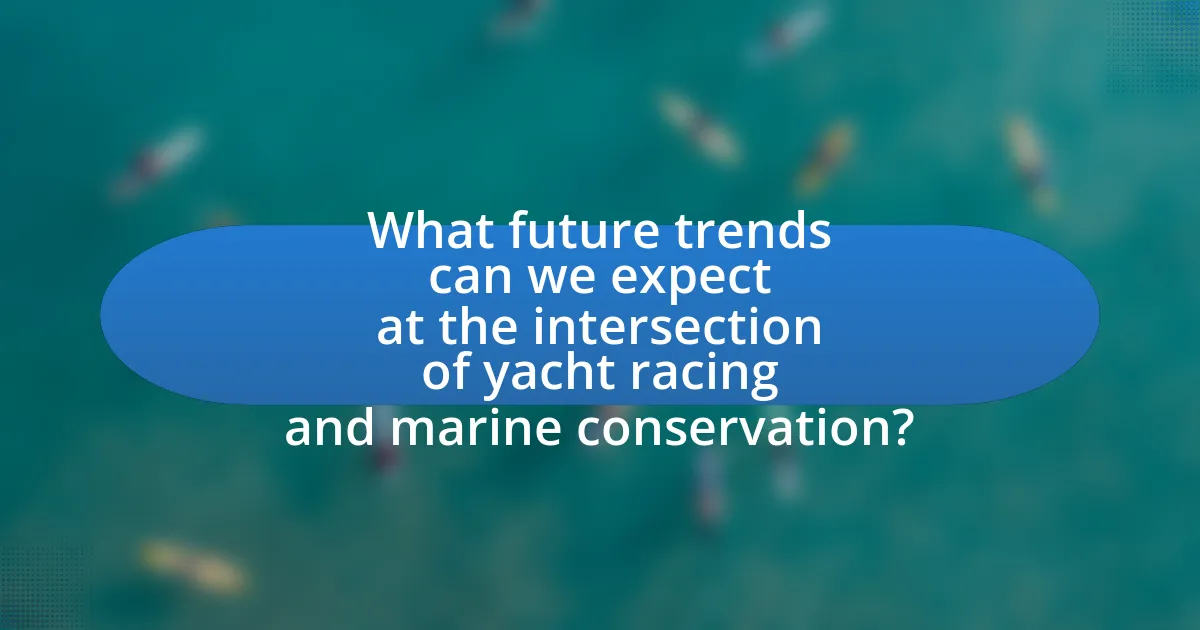
What future trends can we expect at the intersection of yacht racing and marine conservation?
Future trends at the intersection of yacht racing and marine conservation include increased adoption of sustainable technologies and practices within the sport. Yacht racing organizations are likely to implement eco-friendly materials and energy-efficient designs, as seen in initiatives like the World Sailing’s Sustainability Agenda 2030, which aims to promote environmental stewardship. Additionally, there will be a growing emphasis on partnerships between yacht racing events and marine conservation organizations, exemplified by events like the Ocean Race, which integrates ocean health awareness into its framework. These trends reflect a broader commitment to reducing the ecological footprint of yacht racing while raising awareness about marine conservation issues.
How is technology shaping the future of yacht racing and conservation?
Technology is significantly shaping the future of yacht racing and conservation by integrating advanced data analytics, renewable energy solutions, and innovative materials. Data analytics enhances performance and strategy in yacht racing, allowing teams to optimize their designs and sailing techniques based on real-time environmental data. For instance, the use of predictive modeling helps teams anticipate weather patterns and sea conditions, improving race outcomes while promoting safer practices.
In terms of conservation, technology facilitates the development of eco-friendly yachts that utilize renewable energy sources, such as solar and wind power, reducing carbon footprints. The introduction of sustainable materials, like bio-resins and recycled composites, in yacht construction further minimizes environmental impact. According to a study by the International Maritime Organization, transitioning to cleaner technologies in marine vessels can reduce greenhouse gas emissions by up to 30% by 2030.
Moreover, yacht racing events increasingly incorporate conservation initiatives, such as ocean cleanup projects and awareness campaigns, leveraging the visibility of the sport to promote marine conservation efforts. This synergy between technology, yacht racing, and conservation not only enhances competitive performance but also fosters a commitment to protecting marine ecosystems.
What innovations are being developed to reduce the environmental impact of yacht racing?
Innovations being developed to reduce the environmental impact of yacht racing include the use of sustainable materials, hybrid propulsion systems, and advanced waste management technologies. Sustainable materials, such as bio-based composites and recycled plastics, are being integrated into yacht construction to minimize resource depletion and pollution. Hybrid propulsion systems combine traditional engines with electric power, significantly reducing carbon emissions during races. Additionally, advanced waste management technologies, including onboard recycling systems and biodegradable products, are being implemented to manage waste effectively and reduce marine litter. These innovations collectively aim to enhance the sustainability of yacht racing while preserving marine ecosystems.
How can data and research improve conservation outcomes in yacht racing?
Data and research can improve conservation outcomes in yacht racing by providing insights into the environmental impact of racing activities and informing sustainable practices. For instance, studies have shown that yacht racing can contribute to marine pollution and habitat degradation; therefore, data on waste management and emissions can guide teams in adopting eco-friendly technologies and practices. Research conducted by the International Maritime Organization indicates that implementing best practices in waste disposal can significantly reduce marine litter, which is crucial for preserving marine ecosystems. Additionally, data analytics can help identify critical habitats and biodiversity hotspots, allowing yacht racing events to be planned in ways that minimize disruption to these areas. By leveraging scientific research and data, yacht racing can align with conservation goals, ultimately leading to better protection of marine environments.
What can individuals do to support marine conservation through yacht racing?
Individuals can support marine conservation through yacht racing by participating in or organizing events that raise funds for marine protection initiatives. Engaging in yacht races that donate a portion of entry fees to conservation organizations, such as the Ocean Conservancy, directly contributes to marine habitat preservation. Additionally, individuals can advocate for sustainable practices within the yacht racing community, such as reducing plastic use and promoting eco-friendly materials, which helps minimize environmental impact. Research indicates that events like the Volvo Ocean Race have successfully raised awareness and funds for ocean conservation, demonstrating the effectiveness of integrating marine conservation efforts into yacht racing activities.
How can yacht racers engage in conservation efforts during events?
Yacht racers can engage in conservation efforts during events by implementing sustainable practices such as reducing waste, using eco-friendly materials, and participating in local conservation initiatives. For instance, racers can minimize single-use plastics on their vessels and promote recycling among crew members. Additionally, they can collaborate with marine conservation organizations to support habitat restoration projects or participate in clean-up activities in the areas where they race. Evidence of this approach can be seen in events like the Ocean Race, which has integrated sustainability goals into its framework, emphasizing the importance of protecting marine ecosystems while racing.
What are some best practices for promoting sustainability in yacht racing?
Best practices for promoting sustainability in yacht racing include adopting eco-friendly materials, implementing waste reduction strategies, and utilizing renewable energy sources. Eco-friendly materials, such as biodegradable composites and recycled plastics, reduce environmental impact during construction and maintenance. Waste reduction strategies, like minimizing single-use plastics and promoting recycling onboard, help decrease pollution in marine environments. Additionally, utilizing renewable energy sources, such as solar panels and wind turbines, can power yachts sustainably, reducing reliance on fossil fuels. These practices align with the growing emphasis on marine conservation and the need to protect ocean ecosystems.
